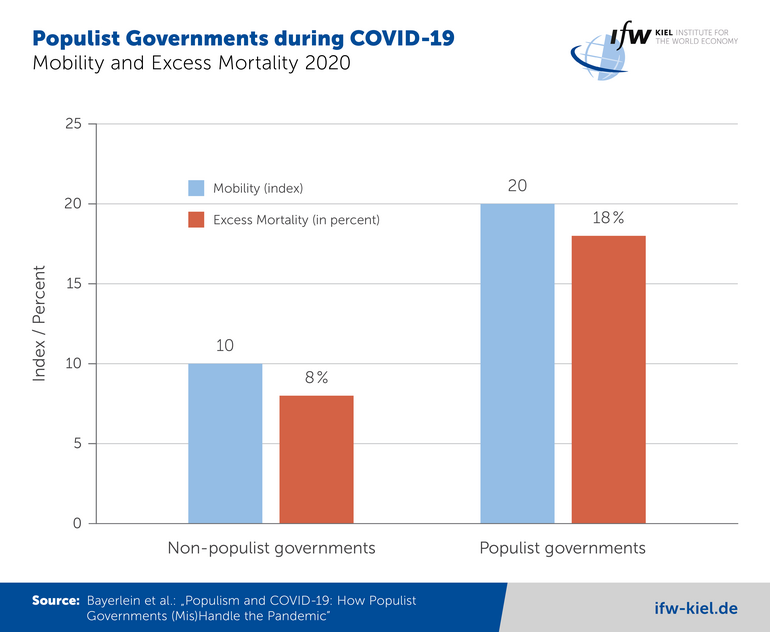News
COVID-19 pandemic: under populist governments, risk of death is higher

”The numbers are clear—populists are the worse crisis managers in the COVID-19 pandemic and responsible for many avoidable deaths in the countries they govern,” says Michael Bayerlein, a researcher on populism at the Kiel Institute for the World Economy. With an international team of researchers, he evaluated the crisis management during the COVID-19 pandemic in 2020 of 42 member countries of the OECD or the BRICS countries.
The aim was to identify differences between populist and non-populist governments (Bayerlein et al.: Populism and COVID-19: How Populist Governments (Mis)Handle the Pandemic). The authors classified a total of 11* governments as populist, including those in Poland, Slovakia, the Czech Republic, Hungary, the United Kingdom, Brazil, and India.
According to the study, on average, significantly more people die as a result of the COVID-19 pandemic on a percentage basis under populist leadership than in non-populist led countries. The so-called excess mortality—the number of deaths above the level that would have been expected even without the pandemic—is a good 8 percent in non-populist-led countries and almost 18 percent in populist-led ones.
Thus, for an otherwise 100 deaths, the COVID-19 pandemic causes 8 additional deaths in non-populist-led countries and 18 additional deaths in populist-led countries, more than twice as many. On average for all countries considered, excess mortality is 10 percent—instead of 100 deaths otherwise, the pandemic causes 110 deaths.

The reason for the significantly higher excess mortality is that citizen mobility is higher in populist governed countries at similar infection rates. To measure this, the authors use mobility data from Google that show how busy certain places such as grocery stores or parks were during the pandemic. The data show that that the movement index in populist-ruled countries, with a value of 20, is twice as high as the value in non-populist-ruled countries, with 10.
The team of authors identifies two reasons for the higher mobility. First, populist governments are less likely to implement long-term and unpopular policies against the spread of the pandemic such as contact restrictions. Second, the communication of populist governments is designed to downplay the severity of the pandemic and to discredit scientific findings. Citizens therefore are less likely to take the virus seriously and to restrict their movement activity on their own initiative.
"Our study is the first to prove that populists are doing a poor job of fighting the COVID-19 pandemic, which is directly reflected in the death toll. The high excess mortality is driven by too much mobility, which in turn is caused by a lack of restrictions and anti-COVID-19 propaganda," Bayerlein said.
"The only good news - the clear link between mobility and death toll also means that people can protect themselves by voluntarily limiting their contacts during the pandemic."
++++
*Note: A previous version of this text erroneously referred to 13 governments classified as populist in the study. In fact, there are 11. We have corrected this.
